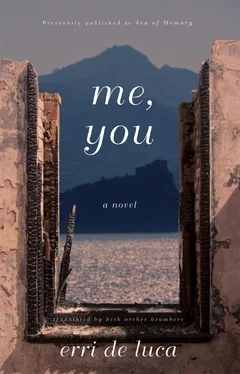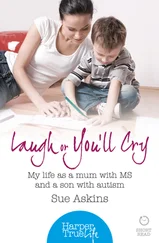A FISH IS a catch once it’s in the boat. It’s a mistake to shout that you’ve hooked it when it has only snapped at the bait and you feel its weight bouncing in the hand that holds the line. A fish is a catch only when it’s on board. You have to pull it up swiftly from the depths with a gentle, even movement, and without jerking. Otherwise you’ll lose it. You mustn’t get excited when you feel it thrashing below and it seems heaven only knows how big judging by the force it exerts to extricate the hook and bait from its body.
Nicola taught me how to fish. The boat wasn’t his, it was Uncle’s, my uncle. Nicola used it year-round, but when the weather was mild he was my uncle’s sailor on Sundays and during summer holidays. At night he went out with a lantern and fished for cuttlefish, a kind of squid, to make bait for the tip of the hook.
He got the boat ready and we would leave early in the morning. The island was silent. Going down to the beach barefoot, a boy could feel that he was slippery smooth because of the rock under his feet, that he smelled good because of the fragrance of baking bread that wafted by his nose from the ovens, that he was grown up because he was going out to sea to acquire a skill. The other boys went to the beach later on to meet girls and swim. The rich ones rode around in circles in their motorboats with gleaming wood and multi-horsepowered motors.
Uncle’s boat had a lazy diesel that crackled on the calm of dawn and made the air vibrate all around, making my nose itch for the duration of the trip. We would sit on the rail sticking out a bit over the edge, even when the waves came up and pounded the prow. Nicola stood in the stern and maneuvered the handle of the rudder with his feet. It was his trade, he was steady, no wave knocked him off balance. Anyone who could stand upright in a small boat that ran against the waves was steady. I was too, and sometimes on the return trip they let me take the rudder while Uncle slept and Nicola straightened up the boat or cleaned the fish.
It wasn’t right for a kid to hold the rudder. You had to go for the other side of the wave and let it pass under the keel without allowing it to strike the boat, because the boat feels the slaps and the wood wears down. But when the sea was calm and there were no boats in sight, I would ask to take the rudder and Nicola could quickly finish what he had left to do.
He taught me the sea thanks to the boat and to the permission of Uncle, who invited me to come along because I kept quiet, I didn’t get the line entangled, I didn’t budge when the fish bit, didn’t complain about the heat, didn’t dive off the boat, except for a quick dip to cool off. Never asked to take fish home; it was his fish, and after him, Nicola’s. Never asked him to take me with him, but the evening before, it was he who would say, “Come.”
Nicola taught me the sea without saying, do it this way. That was the way he did it, and that way was right, not only skillful, but great to watch, never rushed. Nicola’s way had the movement of the waves, his gestures had a purpose that I was learning to understand. He would cut the cuttlefish into finger-length pieces, a slice and a stroke with the flat of the blade to separate them, going at an even rhythm of his own, wholly absorbed in his work. The cut pieces dried in the sun during the ride out to open water. He would pierce the bait in the middle, covering the hook all the way up to where the line was attached. And after the catch, he would retrieve the bait from the mouth of the fish, from its throat, and use it over again. Almost without his watching, his hands worked by themselves. He could look elsewhere, far off or nowhere, letting his hands do the work all by themselves. That was the working part, the front of his body, while the rest of it was just an armature of patience.
In the boat only the men talked. I listened to their voices, not to their conversation, and to the greetings exchanged with other fishermen: “a’ re nuost,” you’re one of us, a cry I have only heard at sea.

Some afternoons I went to the fishermen’s beach and if I found Nicola alone cleaning fish I would go up to him. Amid the debris of the catch, a hen would scratch around in search of an anchovy head to swallow along with the sand. I was a city boy, but in the summer I turned into a savage. Barefoot, the soles of my feet as leathery as the carobs we ate from the tree, bathing in seawater, salty as a herring, dressed in blue jeans, smelling of fish, a few fish scales in my hair, walking with the short strides of a sailor’s gait. In one week I lost my city look. I peeled it off along with the dead skin of my nose and back, where the sun penetrated all the way to the flesh.
The sun is a smoother of surfaces, a kind of sandpaper that during the summer smooths down the earth, evens it out, polishes it, leaving it thin and dry, a film of dust. With the body it does the same thing. Mine, exposed until sundown, split open like a ripe fig, but only in a few places, on my shoulders and nose. I never used sun oil, already available by the mid-fifties. That kind of greasing was for foreigners, shiny skin like a sardine dipped in beaten egg before being fried.
Piscitello addevantasse
int’o sciore m’avutasse
m’afferasse sta manella
me menasse int’a tiella
’onn Amalia ‘a Speranzella . *
With these lines by Salvatore Di Giacomo, Uncle would make fun of people who oiled themselves. His sons and I, the males of the family, from the time we were little, were used to getting burned at the beginning of the season, and then it stopped. I endured the pain as a perfectly legitimate tax on my delicate city dweller’s skin. The new skin cost plenty, on my feet as well before I could walk barefoot on the scorching noonday pebbles.
Nicola had been in the war, an infantryman in Yugoslavia. That had been his only trip, from the island to Sarajevo. He met a family out there. In the evening when he had a pass, he went to visit them, bringing them a little pasta, coffee, bread. They in exchange offered him slivovitz , an infernal alcohol that he barely tasted. They communicated in sign language. The Italian Black Shirts had shot one of the sons of that family. It was on that occasion that they got to know each other, when the family came to collect the body. Nicola had helped them and they invited him to their home. He saw a Muslim cemetery: “Like one of ours, but on the stone instead of a cross there was a crescent.” He felt at home hearing the sounds of mourning, the same high notes as the wail of the women on his island when the tide brought in a drowning victim. That’s how those women sounded with the boy, shot because he was a partizan .
He used to tell me these things with the warning that I was not to talk about them with anyone else, that he knew nothing about politics, that these were only stories about when he was young and the war was going on. There was war just as there was the southwester, drought, a season when tuna didn’t run. There was : a single verb covered all the good and evil that befell human beings. The war lived on in a few odd details that he would relate over and over again: an empty window seen from the street, and behind the window no house, not even a roof, and you could see the sky. Windows are made to see the sky, but not like that. And there was a market square where grass grew because there was nothing to sell and no one ever went there, not even to exchange a few words. Grass can be a sad thing when it grows between the cobblestones of a market.
Читать дальше













